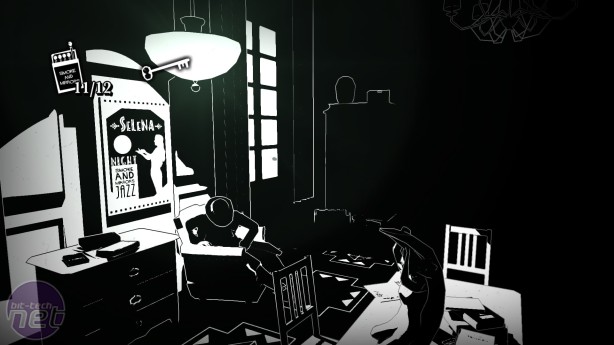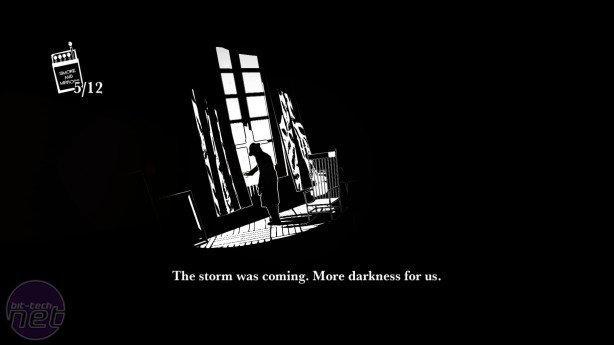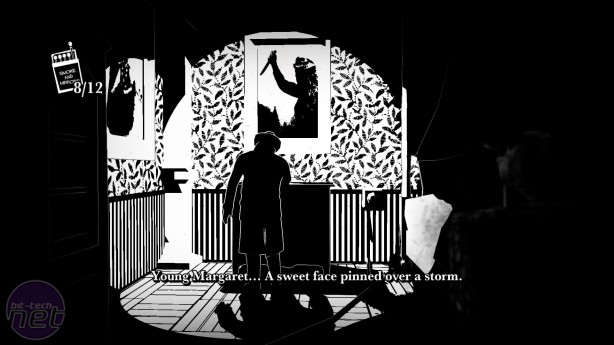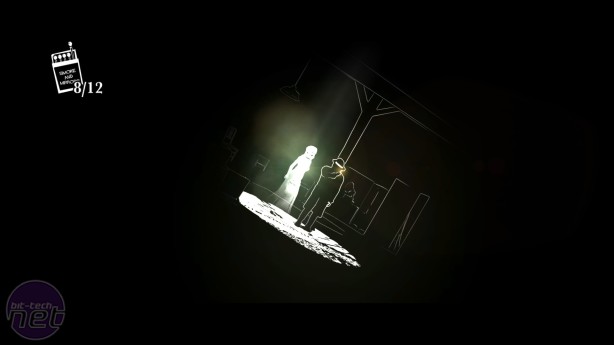
Early on, the most prominent figure in this ghastly tale is Margaret, not least because it's her presence above all others, which lingers in the building. You see her ghostly silhouette huddled in corners and floating through rooms. Get too close and she'll chase you, and if she catches you, it's game over. I like that White Night focuses on a single antagonist who literally haunts your steps throughout the game, although the tank controls that White Night employs do result in some deaths feeling quite cheap. Gradually though, your animosity toward Margaret is accompanied by pity, as you realise that she is far from the only rotten apple in the Vesper's twisted family tree.
As a whole, the story is well layered yet at the same time it's where we find White Night's most damaging problem. So much of White Night's design blends beautifully together, the wonderful aesthetic, the music, the systems. Unfortunately, it's all let down by the writing.
Now, let's be clear, the writing is not completely terrible. But it is highly inconsistent. The various diary excerpts scattered through the mansion are acceptably scripted, but it struggles enormously with the noir-esque narration.
In addition, it gets off to an absolutely dreadful start, upsetting the tone before it has really been established. One particularly cringe-worthy example comes just after the car crash, when the main character states "I tried to collect my thoughts, but the intense pain was scattering them like a bunch of dead birds." Unless they've just collided with a Boeing 747 mid-flight, dead birds are unlikely to scatter. White Night has a thing for wonky similes, and every time it drops one it yanks you out of the world, which is a shame because White Night achieves so much almost everywhere else.
This could partially be a translation issue; Osome is a French development studio. But I think the more likely answer is that the script needs a damn good edit, to strip out the awkward metaphors and unnecessary verbiage. I also noticed a few missing words and spelling mistakes in the diary entries, which further indicates a lack of proofing.
There are a few other problems too. White Night is a case study in the disparity between game logic and real logic. A prime example of this are the matches that form your main source of illumination. You can only carry twelve of them at one time. In a game context, this enhances the tension. Twelve initially seems like plenty, but they burn faster when you run around, and occasionally one or two will fizzle out when struck, which is agony when you've only got a few remaining and need to backtrack through a dangerous area to find more. But it also doesn't make a lick of sense. The thing about matches is they're small. Really small. So small that you can fit several dozen in a box that would easily fit into a trenchcoat pocket. Picking up matches individually stretches credulity to breaking point, and this is a game with ghosts in it, for Pete's sake.
The same goes for the diary entries dispersed throughout the mansion. A diary isn't a packet of seeds; you don't spread its pages about and hope they grow into a story. What's more, every member of the Vesper family is equally careless in leaving their most personal thoughts lying around. It's no wonder they all despise each other, given what they write. I also found the inundation of text to slow the game down tremendously. Sometimes there are three or four diaries within a few feet of each other, which again suggests a need for an editor.
Two more points before we conclude. The puzzles are largely well-thought out in terms of challenge. Most of the clues and items are never too far away, and there are a couple of clever instances of enigmatic foreshadowing, which is satisfying when the requisite item crops up later on and you know exactly what you need to do with it. But the final conundrum is utterly baffling. My figuring it out was entirely down to luck. Lastly, like the introduction, the game's ending fumbles the noir theme with an overlong and stumbling monologue.
White Night is undoubtedly at its best when it shuts up and lets its sights and systems do the talking. In such moments it's an excellent game; creepy, compelling, artful. Sadly the writing and narration is crucial to fulfilling that noir-tone, and when it doesn't work, which is far too frequently, the whole atmosphere collapses. White Night may be afraid of the dark, but it's the editors scissors that it truly fears.
As a whole, the story is well layered yet at the same time it's where we find White Night's most damaging problem. So much of White Night's design blends beautifully together, the wonderful aesthetic, the music, the systems. Unfortunately, it's all let down by the writing.
Now, let's be clear, the writing is not completely terrible. But it is highly inconsistent. The various diary excerpts scattered through the mansion are acceptably scripted, but it struggles enormously with the noir-esque narration.
In addition, it gets off to an absolutely dreadful start, upsetting the tone before it has really been established. One particularly cringe-worthy example comes just after the car crash, when the main character states "I tried to collect my thoughts, but the intense pain was scattering them like a bunch of dead birds." Unless they've just collided with a Boeing 747 mid-flight, dead birds are unlikely to scatter. White Night has a thing for wonky similes, and every time it drops one it yanks you out of the world, which is a shame because White Night achieves so much almost everywhere else.
This could partially be a translation issue; Osome is a French development studio. But I think the more likely answer is that the script needs a damn good edit, to strip out the awkward metaphors and unnecessary verbiage. I also noticed a few missing words and spelling mistakes in the diary entries, which further indicates a lack of proofing.
There are a few other problems too. White Night is a case study in the disparity between game logic and real logic. A prime example of this are the matches that form your main source of illumination. You can only carry twelve of them at one time. In a game context, this enhances the tension. Twelve initially seems like plenty, but they burn faster when you run around, and occasionally one or two will fizzle out when struck, which is agony when you've only got a few remaining and need to backtrack through a dangerous area to find more. But it also doesn't make a lick of sense. The thing about matches is they're small. Really small. So small that you can fit several dozen in a box that would easily fit into a trenchcoat pocket. Picking up matches individually stretches credulity to breaking point, and this is a game with ghosts in it, for Pete's sake.
The same goes for the diary entries dispersed throughout the mansion. A diary isn't a packet of seeds; you don't spread its pages about and hope they grow into a story. What's more, every member of the Vesper family is equally careless in leaving their most personal thoughts lying around. It's no wonder they all despise each other, given what they write. I also found the inundation of text to slow the game down tremendously. Sometimes there are three or four diaries within a few feet of each other, which again suggests a need for an editor.
Two more points before we conclude. The puzzles are largely well-thought out in terms of challenge. Most of the clues and items are never too far away, and there are a couple of clever instances of enigmatic foreshadowing, which is satisfying when the requisite item crops up later on and you know exactly what you need to do with it. But the final conundrum is utterly baffling. My figuring it out was entirely down to luck. Lastly, like the introduction, the game's ending fumbles the noir theme with an overlong and stumbling monologue.
White Night is undoubtedly at its best when it shuts up and lets its sights and systems do the talking. In such moments it's an excellent game; creepy, compelling, artful. Sadly the writing and narration is crucial to fulfilling that noir-tone, and when it doesn't work, which is far too frequently, the whole atmosphere collapses. White Night may be afraid of the dark, but it's the editors scissors that it truly fears.
-
Overall67 / 100


MSI MPG Velox 100R Chassis Review
October 14 2021 | 15:04













Want to comment? Please log in.